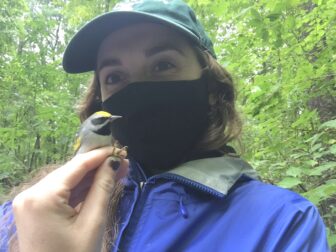
Cassidy Hough hiking the Alum Cave Trail in Gatlinburg, Tennessee.
Two Great Lakes Echo reporters were recently honored for excellence in journalism by the Michigan Press Association’s 2020 College Better Newspaper contest.
Cassidy Hough received first place in feature writing in division 1 for a story she wrote about how climate change is among the stresses leading to greater mental health problems for farmers.
The category recognizes “a story or series other than straight news that demonstrates unusual literary excellence, originality and insight from a human interest or other feature perspective.”
Hough, double majoring in journalism and in environmental studies and sustainability, aspires to a career in food systems, an interest sparked in part by reporting this story.
“By interviewing farmers and extension educators while working on the feature, I got my first look into the future of our troubled food system, and now I’m hoping I can work to improve it,” she said.

Amelia Cole at the Michigan State Bird Observatory’s Burke Lake Banding Station.
The press association also awarded Echo reporter Amelia Cole second place in the news story category in division 1. She was recognized for her story about how the Menominee Indian Tribe of Wisconsin asserted the rights of the Menominee River to exist, flourish and carry out natural ecosystem functions.
The category recognizes “a story providing coverage of a breaking news event or beat that displays accuracy, depth, clarity and impact.”
Cole reported the story in the context of the Rights to Nature movement. She continues to study the intersection of Indigenous and environmental issues as a junior majoring in fisheries and wildlife and minoring in environmental studies and sustainability.
“These very different stories reflect how Echo strives to report how the environment is fundamental to diverse natural, political and social issues,” said David Poulson, editor of Great Lakes Echo. “And these students of very different backgrounds and interests show how the tools of responsible environmental journalism transcend many fields of study.
“We are proud of these journalists and pleased that their thoughtful reporting is recognized by the Michigan Press Association,” he said. “And we are all fortunate that they could illuminate these important issues for the rest of us.”
